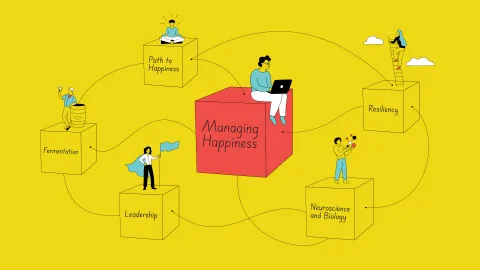Introductory Courses for Anything You Want to Learn in 2025
Originally Published March 7, 2023
Last Updated December 16, 2024
Starting is often the hardest part. Maybe you’ve wanted to learn something for years and you’ve just never found the chance? Or perhaps you’ve decided to start learning but you’re overwhelmed with all the course options?
We’re here to make your start as easy as possible so you can focus on learning a new topic and crushing your education goals. We have a variety of introductory courses in our large catalog of remote, online courses – many of which are free to audit and self-paced, meaning you can start at any time and anywhere.
Ready to start learning?
Data Science
Data Science Principles provides an overview of data science with a code- and math-free introduction to prediction, causality, data wrangling, privacy, and ethics.
Led by data scientist Dustin Tingley, this 4-week paid course is cohort-based which provides learners with the opportunity to collaborate with their fellow learners alongside the course material. Upon completion of the course, learners will receive a verified certificate.
Explore: Data Science Principles
U.S. Government
How do you govern a country as large, diverse, and complex as the United States? In our course American Government: Constitutional Foundations, learners will explore how American politics informed the U.S. Constitution and why its promise of liberty and equality has yet to be fully realized.
This 4-week self-paced course is led by John F. Kennedy School of Government Professor Thomas E. Patterson. The course is part of our XSeries Program in U.S. Government which consists of four related courses on U.S. Political Institutions, Citizen Politics in America, and U.S. Public Policy.
Explore: American Government: Constitutional Foundations
Computer Science
CS50’s Introduction to Computer Science is Harvard University’s introduction to the intellectual enterprises of computer science and the art of programming for majors and non-majors alike, with or without prior programming experience.
An entry-level course taught by David J. Malan, this 12-week self-paced course teaches learners how to think algorithmically and solve problems efficiently. This course can be audited for free or taken as a paid course where learners receive a verified certificate upon course completion.
Explore: Introduction to Computer Science
Shakespeare
Our series Shakespeare’s Life, Work, and Characters provides learners with the foundational knowledge on the cultural significance of William Shakespeare’s plays. The series consists of 4 main courses including:
Shakespeare’s Life and Work: a 4-week course on how to read Shakespeare’s plays through his biography, Elizabethan and Jacobean history, and modern performance.
Hamlet: The Ghost: a 4-week course on the haunting figure at the heart of one of Shakespeare’s most famous plays.
The Merchant of Venice: Shylock: a 4-week exploration of the magnetic and ambivalent character of Shylock.
Othello: The Moor: a 4-week course exploring storytelling in Shakespeare’s Othello alongside world-class artists who interpret Othello’s story in new forms and contexts today.
Learners may audit individual courses or complete them as a paid verified certificate option. The series may also be completed as a paid verified certificate option totaling approximately 4 months of course time.
Explore: Shakespeare’s Life, Work, and Characters
Probability and Statistics
Probability and statistics help to bring logic to a world filled with randomness and uncertainty. In our 10-week self-paced course Introduction to Probability, learners will dive into the concepts behind probability, an essential language and set of tools for understanding data, randomness, and uncertainty.
Learners will acquire the tools needed to understand philosophy, data, science, engineering, economics, and finance – learning not only how to solve challenging technical problems, but also how one can apply those situations in everyday life.
Explore: Introduction to Probability
Education
Introduction to Family Engagement in Education isn’t your typical education course. This course covers what family engagement is and why it matters to the success of students and schools.
In this 6-week self-paced course, learners will explore the research linking family engagement to better educational outcomes and hear directly from researchers, educators, students, and families about promising practices in the field.
Explore: Introduction to Family Engagement in Education
Literature
Embark on a global journey to explore the past, present and future of world literature with our 12-week self-paced course Masterpieces of World Literature. Learners will explore how great writers refract their world and how their works are transformed when they intervene in our global cultural landscape today.
Learners may audit this course for free or take the course as a paid verified certificate-granting option. This course considers classic texts such as Homer’s The Odyssey, Voltaire’s Candide, and Murasaki Shikibu’s The Tale of Genji.
Explore: Masterpieces of World Literature
Neuroscience
The Fundamentals of Neuroscience series includes 3 courses, each covering different key parts from the function of neurons to brain structure. Learners can either take individual courses or the entire series to obtain a paid verified certificate.
The series includes the following fundamental courses: The Electrical Properties of the Neuron, Neurons and Networks, and The Brain. Led by David Cox, Assistant Professor of Molecular and Cellular Biology, and Computer Science, the individual courses range from 5 to 8 weeks in length and can be audited for free in addition to the paid certificate option. The entire series is self-paced and requires 5 months to complete.
Explore: Fundamentals of Neuroscience
Leadership
We live in a world with enormous adaptive challenges for our families, communities, and societies. The need for leadership that can mobilize people to meet these challenges and improve life is critical. In our course Exercising Leadership: Foundational Principles, learners will explore strategies for leading in a changing world.
This 4-week self-paced introductory course will take learners through new ways to approach complex organizational systems and take thoughtful action on the work we all face ahead.
Explore: Exercising Leadership: Foundational Principles
Explore our courses from beginner to advanced topics by searching our Course Catalog for your area of interest. Interested in an introductory course for a topic we haven’t covered yet? Let us know over on Instagram!
Related ArticlesMeet Our Harvard Online Learners Image

Image

|